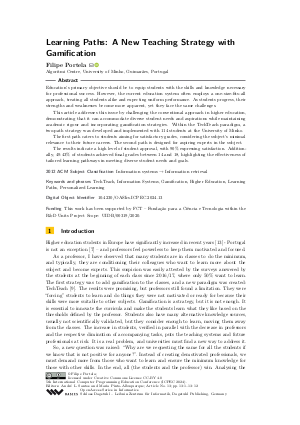Learning Paths: A New Teaching Strategy with Gamification
Author
Filipe Portela 
-
Part of:
Volume:
5th International Computer Programming Education Conference (ICPEC 2024)
Part of: Series: Open Access Series in Informatics (OASIcs)
Part of: Conference: International Computer Programming Education Conference (ICPEC) - License:
 Creative Commons Attribution 4.0 International license
Creative Commons Attribution 4.0 International license
- Publication Date: 2024-09-25
File

PDF
OASIcs.ICPEC.2024.13.pdf
- Filesize: 0.71 MB
- 12 pages
Document Identifiers
Subject Classification
ACM Subject Classification
- Information systems → Information retrieval
Keywords
- TechTeach
- Information Systems
- Gamification
- Higher Education
- Learning Paths
- Personalized Learning
Metrics
- Access Statistics
-
Total Accesses (updated on a weekly basis)
0PDF Downloads0Metadata Views
Abstract
Education’s primary objective should be to equip students with the skills and knowledge necessary for professional success. However, the current education system often employs a one-size-fits-all approach, treating all students alike and expecting uniform performance. As students progress, their strengths and weaknesses become more apparent, yet they face the same challenges. This article addresses this issue by challenging the conventional approach in higher education, demonstrating that it can accommodate diverse student needs and aspirations while maintaining academic rigour and incorporating gamification strategies. Within the TechTeach paradigm, a two-path strategy was developed and implemented with 114 students at the University of Minho. The first path caters to students aiming for satisfactory grades, considering the subject’s minimal relevance to their future careers. The second path is designed for aspiring experts in the subject. The results indicate a high level of student approval, with 90% expressing satisfaction. Additionally, 49.43% of students achieved final grades between 14 and 18, highlighting the effectiveness of tailored learning pathways in meeting diverse student needs and goals.
Cite As Get BibTex
Filipe Portela. Learning Paths: A New Teaching Strategy with Gamification. In 5th International Computer Programming Education Conference (ICPEC 2024). Open Access Series in Informatics (OASIcs), Volume 122, pp. 13:1-13:12, Schloss Dagstuhl – Leibniz-Zentrum für Informatik (2024)
https://doi.org/10.4230/OASIcs.ICPEC.2024.13
BibTex
@InProceedings{portela:OASIcs.ICPEC.2024.13,
author = {Portela, Filipe},
title = {{Learning Paths: A New Teaching Strategy with Gamification}},
booktitle = {5th International Computer Programming Education Conference (ICPEC 2024)},
pages = {13:1--13:12},
series = {Open Access Series in Informatics (OASIcs)},
ISBN = {978-3-95977-347-8},
ISSN = {2190-6807},
year = {2024},
volume = {122},
editor = {Santos, Andr\'{e} L. and Pinto-Albuquerque, Maria},
publisher = {Schloss Dagstuhl -- Leibniz-Zentrum f{\"u}r Informatik},
address = {Dagstuhl, Germany},
URL = {https://drops.dagstuhl.de/entities/document/10.4230/OASIcs.ICPEC.2024.13},
URN = {urn:nbn:de:0030-drops-209820},
doi = {10.4230/OASIcs.ICPEC.2024.13},
annote = {Keywords: TechTeach, Information Systems, Gamification, Higher Education, Learning Paths, Personalized Learning}
}
Author Details
Funding
This work has been supported by FCT – Fundação para a Ciência e Tecnologia within the R&D Units Project Scope: UIDB/00319/2020.
References
-
Pamela Baxter and Susan Jack. Qualitative case study methodology: Study design and implementation for novice researchers. The qualitative report, 13(4):544-559, 2010.

-
Barbara Bray and Kathleen McClaskey. A step-by-step guide to personalize learning. Learning & Leading with Technology, 40(7):12-19, 2013.

-
Przemysław Charzyński, Zbigniew Podgórski, Dariusz Brykała, Aleksandra Zaparucha, and Sylwia Barwińska. Fieldwork on selected educational paths. In the Vistula banks – fieldwork in bilingual education, 2015.

-
Cindy De Smet, Tammy Schellens, Bram De Wever, Pascale Brandt-Pomares, and Martin Valcke. The design and implementation of learning paths in a learning management system. Interactive Learning Environments, 24(6):1076-1096, 2016.

-
Yuli Deng, Dijiang Huang, and Chun-Jen Chung. Thoth lab: A personalized learning framework for cs hands-on projects. In Proceedings of the 2017 ACM SIGCSE technical symposium on computer science education, pages 706-706, 2017.

-
Kathleen M Eisenhardt. Building theories from case study research. The Academy of Management Review, 14(4):532-550, 1989.

- Portugal Gov. Portugal beats records of students in higher education - portugal.gov.pt. https://www.portugal.gov.pt/en/gc23/communication/news-item?i=portugal-beats-records-of-students-in-higher-education. [Accessed 15-04-2024].
-
Amir Hossein Nabizadeh, José Paulo Leal, Hamed N Rafsanjani, and Rajiv Ratn Shah. Learning path personalization and recommendation methods: A survey of the state-of-the-art. Expert Systems with Applications, 159:113596, 2020.

- Filipe Portela. Techteach - An innovative method to increase the students' engagement at classrooms. Information, 11(10), 2020. URL: https://doi.org/10.3390/info11100483.
- Filipe Portela. A New Approach to Perform Individual Assessments at Higher Education Using Gamification Systems. In 4th International Computer Programming Education Conference (ICPEC 2023), volume 112 of Open Access Series in Informatics (OASIcs), pages 8:1-8:12, 2023. URL: https://doi.org/10.4230/OASIcs.ICPEC.2023.8.
-
Filipe Portela. A new approach to perform individual assessments at higher education using gamification systems. In 4th International Computer Programming Education Conference (ICPEC 2023). Schloss Dagstuhl - Leibniz-Zentrum für Informatik, 2023.

-
David Brito Ramos, Ilmara Monteverde Martins Ramos, Isabela Gasparini, and Elaine Harada Teixeira de Oliveira. A new learning path model for e-learning systems. Int. J. Distance Educ. Technol., 19:34-54, 2021.

-
Evan Schofer, Francisco O Ramirez, and John W Meyer. The societal consequences of higher education. Sociology of Education, 94(1):1-19, 2021.

- Miguel Silva, Diogo Ferreira, and Filipe Portela. IoEduc - Bring Your Own Device to the Classroom. In Ricardo Queirós, Filipe Portela, Mário Pinto, and Alberto Simões, editors, First International Computer Programming Education Conference (ICPEC 2020), volume 81 of Open Access Series in Informatics (OASIcs), pages 23:1-23:9, Dagstuhl, Germany, 2020. Schloss Dagstuhl - Leibniz-Zentrum für Informatik. URL: https://doi.org/10.4230/OASIcs.ICPEC.2020.23.
- Anna Sirén and Vassilios Tzerpos. Automatic learning path creation using oer: A systematic literature mapping. IEEE Transactions on Learning Technologies, 15:493-507, 2022. URL: https://api.semanticscholar.org/CorpusID:251077865.
- USC. Learning Outcomes - Center for Teaching Excellence | University of South Carolina - sc.edu. https://sc.edu/about/offices_and_divisions/cte/teaching_resources/course_design_development_delivery/learning_outcomes/index.php. [Accessed 15-04-2024].
-
Robert K Yin. Case study research and applications: Design and methods. SAGE Publications, 2017.

